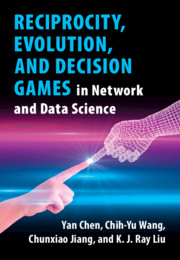Book contents
- Frontmatter
- Contents
- Preface
- 1 Basic Game Theory
- Part I Indirect Reciprocity
- Part II Evolutionary Games
- 6 Evolutionary Game for Cooperative Peer-to-Peer Streaming
- 7 Evolutionary Game for Spectrum Sensing and Access in Cognitive Networks
- 8 Graphical Evolutionary Game for Distributed Adaptive Networks
- 9 Graphical Evolutionary Game for Information Diffusion in Social Networks
- 10 Graphical Evolutionary Game for Information Diffusion in Heterogeneous Social Networks
- Part III Sequential Decision-Making
- Index
8 - Graphical Evolutionary Game for Distributed Adaptive Networks
from Part II - Evolutionary Games
Published online by Cambridge University Press: 01 July 2021
- Frontmatter
- Contents
- Preface
- 1 Basic Game Theory
- Part I Indirect Reciprocity
- Part II Evolutionary Games
- 6 Evolutionary Game for Cooperative Peer-to-Peer Streaming
- 7 Evolutionary Game for Spectrum Sensing and Access in Cognitive Networks
- 8 Graphical Evolutionary Game for Distributed Adaptive Networks
- 9 Graphical Evolutionary Game for Information Diffusion in Social Networks
- 10 Graphical Evolutionary Game for Information Diffusion in Heterogeneous Social Networks
- Part III Sequential Decision-Making
- Index
Summary
Distributed adaptive filtering has been considered to be an effective approach for data processing and estimation over distributed networks. Most existing algorithms focus on designing different information diffusion rules, regardless of the evolutionary characteristics of a distributed network. In this chapter, we study the adaptive network from the game-theoretic perspective and formulate the distributed adaptive filtering problem as a graphical evolutionary game. With this formulation, the nodes in the network are regarded as players and the local combiner of estimated information from different neighbors is regarded as a form of diverse strategy selection. We show that this graphical evolutionary game framework is very general and can unify the existing adaptive network algorithms. Based on this framework, as examples, two error-aware adaptive filtering algorithms are discussed. Moreover, we use graphical evolutionary game theory to analyze the information diffusion process over the adaptive networks and the evolutionarily stable strategy of the system. Finally, simulation results are shown to verify the effectiveness of the method discussed in this chapter.
Keywords
Information
- Type
- Chapter
- Information
- Publisher: Cambridge University PressPrint publication year: 2021
